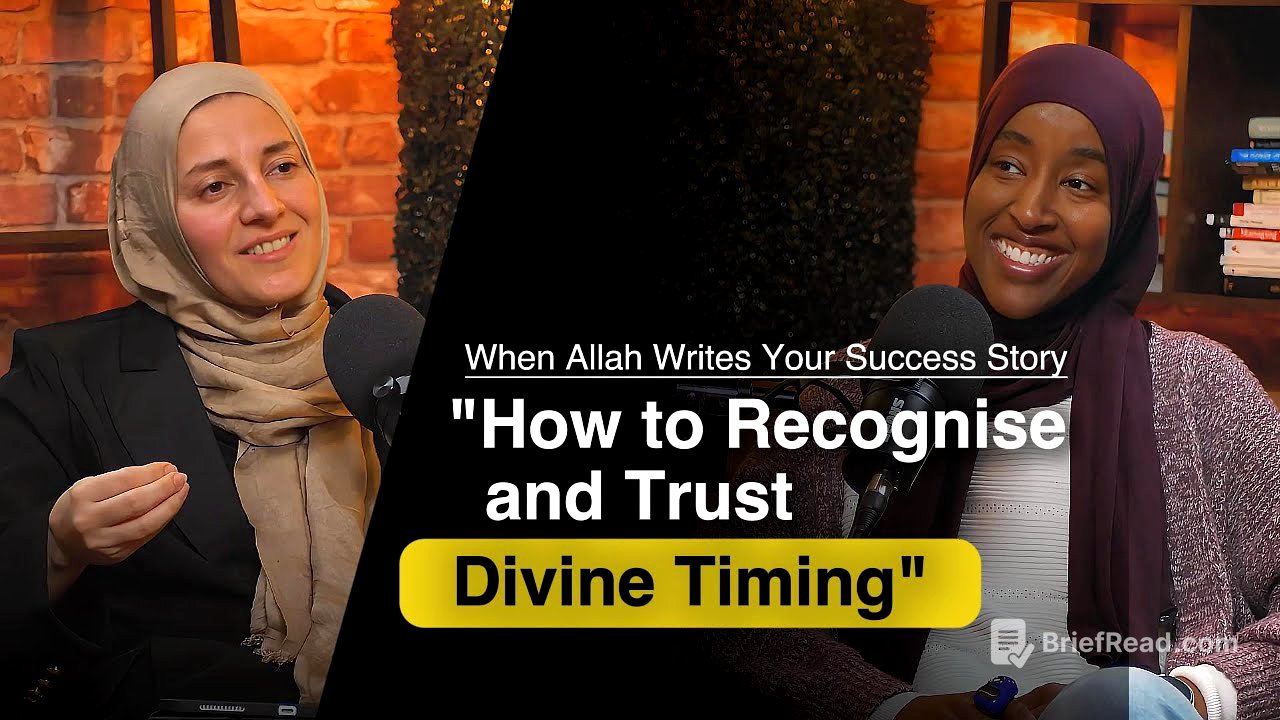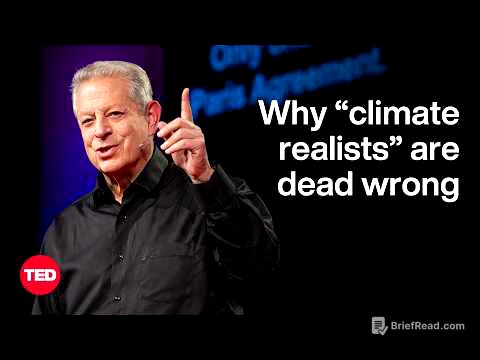TLDR;
In this insightful conversation, Sumayah Hassan shares her personal and professional journey, emphasising the importance of faith, continuous learning, and service to others. She discusses overcoming limiting beliefs, the transformative power of the Qur'an and Istighfar, and the significance of professionalism and setting boundaries in Muslim businesses.
- The importance of faith and continuous learning.
- Overcoming limiting beliefs and imposter syndrome.
- The transformative power of Qur'an and Istighfar.
- Professionalism and setting boundaries in Muslim businesses.
Trailer [0:00]
The trailer highlights key themes from the conversation, including the transformative power of faith, the importance of saying no, and the value of sharing knowledge. It touches on personal growth, career pivots, and the significance of spiritual practices like Istighfar.
Introduction: "Who are you, Samayah?" [1:30]
Khadijah Safari introduces Sumayah Hassan, acknowledging her work on "Honest Tea Talk" and her engagement with the Qur'an. She asks Sumayah to define herself beyond labels, positions, and work.
Samaya’s self-identity: "A person of God, trying her best." [1:56]
Sumayah describes herself as a person of God who is trying her best, a human being, and someone's baby. She clarifies that she has not always been the person she is now, indicating a journey of change and growth.
Personal growth: "I’m not the same person I was." [2:16]
Sumayah reflects on her journey of change and growth, noting significant shifts approximately every seven years. She feels driven in a particular direction, even if it presents challenges.
Mentoring Muslim women: "Remembering who they are & who Allah is." [3:04]
Sumayah discusses her current work mentoring Muslim women from diverse backgrounds, helping them remember who they are and who Allah is. She notes that everyone is going through something, and she aims to be a supportive voice in their lives.
The backstory: Healing journey & emotional disconnect. [3:53]
Sumayah shares her backstory, explaining that her counselling work stemmed from her own healing journey. She used to be very much in her head and disconnected from her emotions, finding emotional expression off-putting.
Societal vs. self-pressure: "Where does the drive come from?" [5:20]
Sumayah reflects on the source of her drive, noting that it wasn't overt family pressure but an internal desire to be accomplished, inspired by her father. She also acknowledges the academic pressure prevalent in Egypt, where she grew up.
Education & expectations: Growing up in Egypt vs. the US. [5:55]
Sumayah contrasts the academic environment in Egypt, where parents heavily planned their children's futures, with her own experience. Although she knew she would attend college in the US, she still felt an underlying pressure to do enough.
Internal vs. external validation: "People see 100%, I feel 30%." [6:45]
Sumayah discusses the internal nature of her drive, explaining that despite external accomplishments, she often feels like she's only at 30%. She acknowledges that others may perceive her achievements as 100%, but her internal feeling is different.
Moving in silence: "Between me and Allah." [7:35]
Sumayah shares her strategy of moving in silence, keeping her goals private until she achieves them. This approach ensures that her efforts are primarily between her and Allah.
Career pivot: From biology to design & entrepreneurship. [7:48]
Sumayah recounts her career pivot from biology to design and entrepreneurship. After deciding against medical school, she pursued an MBA and eventually became a graphic designer.
Breaking the "one path" myth: "That’s not the deal." [9:22]
Sumayah challenges the notion of following a single, predetermined career path. She highlights that it's okay to move between disciplines and industries, rather than sticking to one thing until retirement.
University vs. real-world skills: "10% of what I needed." [10:23]
Sumayah reflects on her university education, estimating that it provided only 10% of the skills she needed for the real world. She acknowledges that she uses graphic design and marketing skills to this day.
Faith in early adulthood: "It was just… there." [10:58]
Sumayah describes her faith in her early 20s as being present but not a primary focus. Growing up in a practicing household, faith was always there, but she was more focused on building her life in a new country.
Quitting a dead-end job: "You can’t just learn? I’m out." [12:14]
Sumayah recounts quitting her internship after being told she "can't just learn" coding. She recognised the job as a dead end and decided to leave, despite advice to stay for the sake of her resume.
Self-taught success: Building a portfolio & landing a dream job. [13:30]
After quitting her internship, Sumayah immersed herself in design, building a portfolio from scratch. Within four months, she applied for mid-weight positions, eventually landing a job at a startup with three times the salary.
Learning beyond traditional education. [15:11]
Sumayah reflects on her self-taught success, highlighting the power of learning in the right way. She emphasises that there isn't only one way to learn or achieve results, and that guidance and intention are key.
Overcoming limiting beliefs: "You can learn anything." [16:28]
Sumayah addresses the limiting beliefs that many women have about their ability to learn new things. She suggests that interest is key and that surrounding oneself with people who are achieving what you dream of can make it seem more attainable.
Faith-driven purpose: "Allah’s plan vs. self-doubt." [17:56]
Sumayah connects faith to achieving goals, explaining that when something is meant for you, Allah writes it to happen. She encourages listeners to hold on when they feel a push towards something, even if they experience self-doubt.
Reluctant pivots: "I went kicking and screaming." [19:16]
Sumayah shares that she has experienced pivots where she went "kicking and screaming," feeling like she wasn't cut out for them. However, she realised that Allah had shaped her for those moments and that she was actually good at them.
Duty to share knowledge: "You have a solution—solve it." [20:31]
Sumayah believes it's her duty to share her knowledge and skills to solve problems that are put in front of her. She feels that everything she has achieved has been given to her by Allah, and she needs to use it to help others.
Building for the Akhirah: "Why not give your all?" [21:30]
Sumayah emphasises the importance of building for the Akhirah (afterlife) and giving one's all in this life to create a lasting impact. She frames it as a duty to use one's abilities to help spread a message or deliver a service that will continue even after one is gone.
Humility vs. ambition: "Allah’s using you—hold the space." [24:08]
Sumayah addresses the fear of arrogance when doing public-facing work. She suggests acknowledging that one's abilities are from Allah and taking oneself out of the equation to maintain humility.
Turning point: Faith as a forefront. [25:27]
Sumayah discusses the pivotal moments that brought her faith to the forefront of her life. She shares how being in mixed company in the US for the first time made her realise the gaps in her knowledge and the need to own her religion.
Hijab & prayer in a corporate space. [26:40]
Sumayah recounts her experience of being the only hijab-wearing woman in her workplace and praying at work. She felt confident in her difference and found that her colleagues were respectful and accommodating.
UN experience: "These are just people." [28:09]
Sumayah shares her experience attending the United Nations General Assembly meeting with her father. She realised that even the most important people are just people, which helped her overcome intimidation in other environments.
Redefining intelligence: "Making good choices." [29:43]
Sumayah redefines intelligence as the ability to make good choices, rather than just academic achievement. She believes that intelligence is about weighing up what's right and wrong and making intentional decisions.
Deepening faith: A life-changing tafsir class. [31:05]
Sumayah shares how joining an online tafsir class deepened her faith. She was inspired by the women in the class and felt a shift in herself, becoming more conservative in her practice.
Introduction: A transformative journey with the Qur’an [31:30]
Sumayah introduces her transformative journey with the Qur'an, highlighting the impact of Qur'anic reflection and sharing its impact with others.
Discovering Qur’anic reflection & sharing its impact [32:10]
Sumayah discusses how she discovered Qur'anic reflection or tadabbur and felt compelled to share it with others, feeling like it was something that had been missing in her life.
Overcoming imposter syndrome as a Muslim woman [32:48]
Sumayah acknowledges the imposter syndrome that many Muslim women struggle with when considering sharing their knowledge. She felt hesitant and second-guessed herself, wondering if what she had to offer was valuable enough.
Teaching the first workshop & overcoming hesitation [33:20]
Sumayah recounts how a friend forced her to teach her first workshop, which received positive feedback. This encouraged her to book a hall and offer her workshop to a larger audience.
Charging for knowledge & breaking societal norms [34:14]
Sumayah shares that she charged £35 for her workshop, which some people thought was too much. Despite this, people came, and it was a beautiful experience.
Advice for women doubting their worth to share knowledge [34:36]
Sumayah advises women who doubt their worth to share their knowledge, emphasising that Allah didn't give them that knowledge for nothing. She highlights that there are people who will resonate with their unique way of talking and expressing things.
“People come to you because you’re YOU” [35:31]
Sumayah stresses that people will come to you because you're you and they need to learn from you. She uses the example of her own revert journey, where she connected with non-practical Muslims who were right for her at that stage in her life.
How struggles shape your ability to serve others [36:16]
Sumayah reflects on how the ups and downs in her life have shaped her ability to serve others. She believes that being in particular lows has changed the way she thinks, allowing her to relate to and understand people better.
Finding purpose in life’s lows & building faith [37:07]
Sumayah shares that she needed to be in particular lows because it changed the way she thinks. She believes that Allah puts you through things and shows you things, and now she cannot judge people.
Faith as the foundation for entrepreneurship [38:25]
Sumayah discusses the importance of faith in business and entrepreneurship. She acknowledges that doing your own thing comes with ups and downs, but faith can help you navigate those challenges.
A health crisis that reshaped priorities [39:21]
Sumayah shares that she became incredibly sick in the last year, which shifted her perspective. She felt an urgency to use her time, platform, and gifts seriously.
Facing mortality & embracing urgency in service [40:33]
Sumayah explains that having death in front of her shifted her priorities rapidly and clearly. She realised she needed to double down on serving others and focusing on legacy and impact.
The healing power of Surah Al-Baqarah & Istighfar [41:39]
Sumayah discusses the healing power of Surah Al-Baqarah and Istighfar. She started reading Surah Al-Baqarah daily and keeping a log of miracles, which has been phenomenal.
Miracles from consistent Qur’an & repentance [44:15]
Sumayah shares that when she became unwell, she started reading Surah Al-Baqarah more than once a day and doing her Istighfar with concentration. She noticed a shift in her symptoms and started to get better.
Competing in good deeds (30k Istighfar challenge!) [45:37]
Sumayah introduces the 30k Istighfar challenge, encouraging people to compete in good deeds. She emphasises that the number is arbitrary and meant to be a large quantity, and that Allah opens doors for those who strive to do more.
How spiritual practices transform every area of life [47:50]
Sumayah explains that Istighfar changes you and adjusts things in your life that you didn't even know were a problem. She shares that clients start coming, and Allah shows you the reality of people.
Istighfar as a “gateway” to deeper worship [51:24]
Sumayah describes Istighfar as a gateway practice that opens the doors for other acts of worship. She explains that when you start your Istighfar, the Qur'an becomes easier, and Allah opens the doors for your prayers.
Sins blocking blessings: The “cloud” analogy [52:41]
Sumayah uses the analogy of a cloud to explain how sins block blessings. She shares that the Prophet Muhammad (peace be upon him) tells us that a servant of Allah is prevented from risk because of a sin that he commits.
Valuing your work & charging professionally [54:00]
Sumayah discusses the importance of valuing your work and charging professionally. She shares that she bumped the price of her workshop up to £150 and that it gave her the confidence to do it.
Setting boundaries & saying NO with confidence [56:11]
Sumayah talks about the power of saying no, especially when you're new at freelancing or working for yourself. She shares that she learned to put boundaries down and not do any work for free.
Muslim businesses & the power of professionalism [57:30]
Sumayah emphasises the importance of Muslim businesses providing such a professional service that they are people's first choice. She believes that as an Ummah, we need to be in a position of strength when there is calamity in the world.
Final message: Qur'an, Al-Baqarah, Istighfar [1:00:23]
Sumayah shares her final message, emphasising the importance of Qur'an, Al-Baqarah, and Istighfar. She encourages listeners to cycle through the Qur'an and do their Istighfar.
Where to find Sumayah Hassan [1:01:02]
Sumayah shares where people can find her online: her website sumayahassan.com, her Substack sumeya.substack.com, and Instagram.









